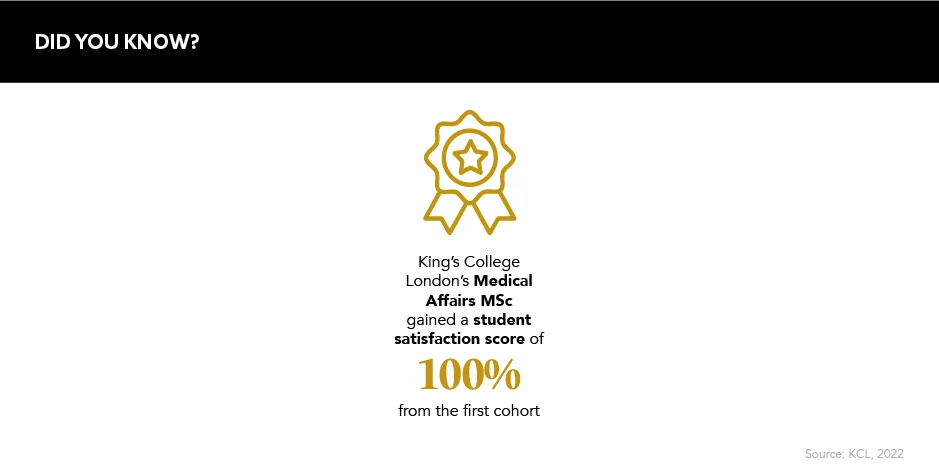The medical affairs function is becoming increasingly complex, and there are myriad ways individuals can prepare for and be supported in roles in this intricate field, including the most recent addition of postgraduate education
Words by Danny Buckland
Generations of medical affairs professionals have learnt their craft the hard way, forging careers from frontline experience, ad hoc mentoring and trial and error. But as these executives face increasingly diverse demands and pressures – such as healthcare system fracture and reform under the force of shifting engagement patterns with HCPs and advances in novel and personalised therapies – will learning on the job serve the next generation of workers?
This is a question that led to the creation of a ground-breaking master’s degree in medical affairs at King’s College London (KCL), taking its first cohort of students in September 2021. Science graduates often struggle to adapt and accelerate their careers as their academic studies have not fully prepared them to work in complex, corporate settings. As such, the MSc course collaborates closely with the pharmaceutical industry to deliver a unique education that readies students for successful careers in a fast-evolving and innovative market.
Industry lessons
“Industry collaboration is central to the course. We have some important involvement from companies that recognise that medical affairs is changing and want to contribute to equipping new employees with the right skills and mindset,” says Carl Naraynassamy, Director, Medical Affairs MSc, KCL.
Students, who are challenged to think beyond the science, benefit from placements at major companies such as Novartis, Novo Nordisk, Bayer and Takeda, as well as mentoring from senior figures at the heart of the medical affairs function. “A key feature of a pharma career is that you will do less technical work and more managerial work and decision-making as you progress,” continues Naraynassamy, “yet many are not introduced enough in their academic studies to the concept of making decisions that apply scientific understanding.”
The course, which requires applicants to have a bachelor’s degree in a science subject, aims to help students build business acumen to complement their technical abilities, and linking science and commercial activity is a strong focus of the one-year degree.
“We educate the students on what happens when a drug is developed and registered and also help them understand that they will not always face black and white decisions. We give them latitude to question why things are done in a certain way and find solutions when things don’t work rather than asking the person who appears to be in authority for the solution,” adds Naraynassamy. In his view, this will help students assimilate into pharma’s corporate environment and facilitate their future career progression through the industry.
Secret to success
As well as having the chance to undertake work placements, students also complete dissertations supervised by senior pharma figures from around the world. Topics include the value of social media to pharma companies, vaccine manufacturing post COVID-19 and the relationship between medical affairs and patient-centricity.
“I am proud that we have been able to engage many industry medical affairs practitioners to teach and supervise these dissertations,” says Naraynassamy. “Just think about the quality of the learning experience of being supervised by the Chief Medical Officer in a top 10 pharma company and the impact this makes on the student’s CV.”
Industry collaboration is central to the course
Naraynassamy believes the partnership with pharma is key to the course’s success, and this view is also held by Dr Pol Vandenbroucke, Former Chief Medical Officer, Pfizer’s Hospital Unit, who champions the course and its collaborative ethos. “This programme is unique because it benefits from the collaboration between industry and academia and maintains a high academic standard while providing the students with great insight into how industry works and what is needed to be successful as a medical affairs professional,” he says. “This type of programme is highly needed because, even in the recent past, medical affairs was, in general, not formally taught. It was more of an apprentice system where people would learn on the job.”
Sweeping changes in healthcare, accelerated by the pandemic, have increased the breadth of the stakeholders a medical affairs professionals will need to interact with, such as government, academia, civil society, the media and other private companies. Dr Vandenbroucke, who is also a Board Member of both the World Demographic and Ageing Forum and the IFAPP Academy, believes these changes have underscored the importance of medical affairs and industry’s need for well-trained graduates who can function effectively from day one.
Student perspective
While the industry and academics clearly view an MSc in medical affairs positively and see huge benefits for the students who complete it, the real crux of its value lies in feedback from the graduates themselves.
When Rufaida Hamad finished her bio sciences degree at Plymouth University, she knew she did not want to follow the majority of her peers into clinical work. “Everything was science focused, but there was little talk about industry because everyone wanted to go into medicine or dentistry,” she says. “I looked around at master’s courses and this appealed because it offered a route to use my scientific knowledge in industry but not in a laboratory environment.”
The entire course was an incredible way into industry and to be taught by industry professionals is so valuable
Part of the MSc’s first cohort, Hamad won a placement on Takeda’s product planning team dealing with pipeline assets, medical affairs and patient engagement. Her dissertation focused on the role of insulin growth factors and whether it is the link between cancer and obesity. “Takeda was very supportive and also gave me the opportunity to speak to other functions. It was an amazing experience,” adds Hamad, who is now undertaking an internship in pharmacovigilance at another pharma company after having graduated from the MSc in the summer of 2022.
“The entire course was an incredible way into the industry and to be taught by industry professionals is so valuable,” she concludes. “I had a really good experience on the course, and I don’t think I would have got to the position that I am in now without it.”
The benefits of such industry-academic collaboration are palpable. This particular course may have been a world-first, but it’s unlikely to be the last, and, if its initial success is anything to go by, the future of the medical affairs workforce certainly looks bright.







